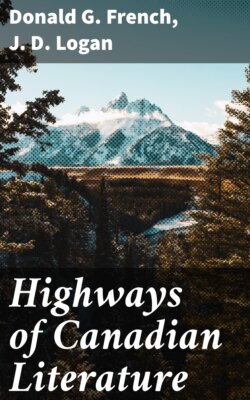Читать книгу Highways of Canadian Literature - J. D. Logan - Страница 13
На сайте Литреса книга снята с продажи.
ОглавлениеPearl of the West!—since first my soul awoke
And on my eyes thy sylvan beauties broke,
Since the warm current of my youthful blood
Flowed on, thy charms, of mountain, mead, and flood
Have been to me most dear. Each winning grace
E’en in my childish hours I loved to trace,
And, as in boyhood, o’er thy hills I strode,
Or on thy foaming billows proudly rode,
At ev’ry varied scene my heart would thrill,
For, storm or sunshine, ’twas my Country still,
And now, in riper years, as I behold
Each passing hour some fairer charm unfold,
In ev’ry thought, in ev’ry wish I own,
In ev’ry prayer I breathe to Heaven’s high throne,
My Country’s welfare blends—and could my hand
Bestow one floweret on my native land,
Could I but light one Beacon fire, to guide
The steps of those who yet may be her pride,
Could I but wake one never dying strain
Which Patriot hearts might echo back again,
I’d ask no meed—no wreath of glory crave—
If her approving smile my own Acadia gave!
Are those lines any less true, human, sincere, winning poetry than the opening apostrophe of Goldsmith’s Deserted Village?—
Sweet Auburn! loveliest village of the plain;
Where health and plenty cheered the laboring swain,
Where smiling Spring its earliest visit paid,
And parting Summer’s lingering blooms delayed:
Dear lovely bowers of innocence and ease,
Seats of my youth, when every sport could please,
How often have I loitered o’er thy green,
Where humble happiness endeared each scene!
How often have I paused on every charm....
and so on. ‘Pearl of the West!’—in just as short, apt, and felicitous poetic phrase as Goldsmith’s apostrophe ‘Sweet Auburn!’ Howe signalizes Nova Scotia, her natural beauty and magic, her ‘homeland’ thrall over the heart and imagination of her native sons, a thrall of mountain, mead, and wood, and flood, of kinship with nature and of pride in her resources on land and sea. His Acadia is all authentic poetry.
As a lyrist of the beauty and pathos of the Commonplace, after the manner of Burns, Howe ranks well, as in his lyrics of this species, To The Linnet, The Deserted Nest, and To the Mayflower (trailing arbutus). It is, however, as a Poet of Humor that Howe must be regarded as somewhat unique in the literary history of Canada. For in his humorous verse Howe does not indulge in the ludicrous or in sheer absurdity, as did George T. Lanigan. Rather Howe employs an unconventional method of dignifying the human spirit, as in his playful manner of signalizing the heart qualities of the Nova Scotian in his poem The Blue Nose and in A Toast (to Haliburton). Seldom did Howe use satire in humorous verse. But whenever he did so, he employed the manner of Burns, and in the form of epigram, as in To Ann and in this smart epigram, To a Lady (whose Eyes were Remarkably Small):—
Your little eyes, with which, fair maid,
Strict watch on me you’re keeping,
Were never made to look; I’m ’fraid
They’re only fit for peeping.
Joseph Howe was a ‘poet frustrate.’ Had he been able to devote himself wholly to verse, there is no doubt that he would have left a considerable body of authentic poetry. The bad in his verse is like the bad in the verse of his superiors, but the best of Howe’s verse is genuine poetry. Yet however high or low individual critics may estimate the aesthetic and artistic qualities of his verse, Joseph Howe has a right to a place in the history of Canadian poetry, and to a distinctive place in the history of Canadian humorous poetry.
As the inaugurator of the Epoch of the Independent Nativistic Prose Literature of Canada, as an authentic creator of Literary Journalism and Literary and Forensic Oratory, and as a significant, though frustrate Poet, Joseph Howe was, as Samuel Johnson said of Goldsmith,—‘a very great man.’
